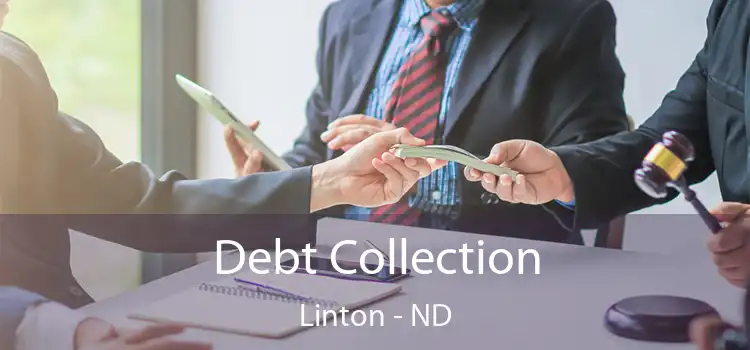Trust The Best Debt Collection Agency in Linton, ND For Bad Debt Collection, Personal Debt Collection, And Many Other Debt Collection Services.
Debt is a part of your life. In fact, the average U.S. household owes more than $155,622 in debt (which includes automobile and mortgage obligations). This can be a huge burden, especially if you're struggling to make payments on time. If you find yourself in this situation, it's essential to know your rights and what debt collectors can and cannot do. Here we'll talk about how Debt Collectors work, what they can do to get money from you, and how to protect yourself from harassment. We at Rubicon Credit Management understand how debt can be a difficult and stressful situation. Our goal is to help you understand your rights and options so that you can make the best decisions for your financial future. So, let's begin.

What is Debt Collection?
Debt collection is the process of pursuing payments on outstanding debt. This can include contacting debtors by phone, mail, or in person. Debt collectors may also file lawsuits or garnish wages in order to get the money they're owed. To Collect Debt, debt collectors must have a valid account. This account must include the creditor's name, the amount owed, and the last payment date. If a debt collector contacts you, they will likely ask you to pay the debt in full. However, you may be able to negotiate a Payment Plan or settlement. It's important to remember that you have rights when it comes to debt collection.
The Fair Debt Collection Practices Act (FDCPA) is a federal law that protects consumers from unfair or abusive debt collection practices. Under the FDCPA, debt collectors are prohibited from using threatening or harassing language. They also cannot make false statements about your debt, such as claiming that you owe more money than you actually do. If a debt collector violates the FDCPA, you can file a complaint with the Consumer Financial Protection Bureau (CFPB). When dealing with debt collections, it's essential to know your rights. Rubicon Credit Management will help you navigate the debt collection process and protect you from harassment. We're here to help you get out of debt and on the path to financial freedom. Call us at 877-600-2345.
Consumer Debt - What You Need to Know
When you first hear the term "consumer debt," it might not mean much to you. But if you stop to think about it, chances are you have some form of consumer debt. In fact, according to a report from the Federal Reserve, the average American has over $9,000 in Credit Card Debt alone. Consumer debt is any debt incurred for personal, rather than business or investment, purposes. This can include credit card debt, student loan debt, medical debt, and even some forms of home equity loans.
What is a Debt Collection Agency?
A debt collection agency is a company that specializes in recovering unpaid debts. Typically, these agencies are hired by Creditors to collect payments from debtors who have fallen behind on their payments. The first thing you need to know about a debt collection agency is that they are not the same as a credit bureau. A credit bureau only reports information about your Credit History, whereas a debt collection agency actually collects payments from you.

What Does a Debt Collection Agency Do?
A debt collection agency will typically contact you by phone or mail in an attempt to collect the Outstanding Debt. In some cases, they may also visit your home or place of business. If you do not make arrangements to pay the debt, the agency may take legal action against you. This could include filing a lawsuit or garnishing your wages.
How to Deal With a Debt Collection Agency
If a debt collection agency contacts you, it is important to know your rights. Under the Fair Debt Collection Practices Act (FDCPA), collectors cannot harass or abuse debtors. They are also prohibited from making false or misleading statements. For example, they cannot tell you that you will be arrested if you do not Pay The Debt. You can file a complaint with the Federal Trade Commission (FTC) if you believe that a collector has violated your rights.
Linton Common Debt Collection Tactics
Debt collection agencies use a variety of methods to collect debts. Some common debt collection tactics include:
-
Calling debtors repeatedly
-
Making threats or using intimidation
-
Contacting debtors at odd hours
-
Disclosing information about the debt to third parties
-
Filing lawsuits
If a debt collector contacts you, it is essential to know your rights as per debt collection laws. The Fair Debt Collection Practices Act (FDCPA) protects consumers from being harassed or mistreated by debt collectors. Under the FDCPA, debt collectors are prohibited from using abusive, unfair, or deceptive practices when Collecting A Debt. If you believe a debt collector has violated the FDCPA, you can file a complaint with the Consumer Financial Protection Bureau (CFPB).
What is Meant by Bill Collection and/or Bill Collector?
Bill collection is the process of contacting a debtor and requesting payment. This can be done by phone, mail, or in person. A Bill Collector is an individual or agency hired to collect overdue payments.
What Happens if You Don't Pay Your Bills?
If you don't pay your bills, the creditor may hire a collection agency to collect the debt. The collection agency will then contact you and request payment. If you don't pay the debt, the collection agency may report the debt to the Credit Reporting Agencies. This will result in negative information being added to your credit report.
How to Deal with Linton Debt Collectors
No one looks forward to dealing with debt collectors. The calls are annoying, and the process can be stressful. But it doesn't have to be that way. Here are a few tips on how to deal with debt collectors:
1. Don't Ignore Them
This is the worst thing you can do. Ignoring debt collectors will only make the situation worse. They will keep calling, and the calls will become more aggressive. Eventually, they may even take legal action against you.
2. Be Polite
It's important to be polite when you're dealing with debt collectors. This doesn't mean that you have to be friends with them, but it does mean that you should be respectful.
3. Get Everything in Writing
Make sure you get everything in writing. This includes any agreements you make with the debt collector. This will protect you in case there is any misunderstanding later on.
4. Know Your Rights
You have rights when you're dealing with debt collectors. Familiarize yourself with these rights so that you can protect yourself.
5. Keep Cool
It's important to keep cool when you're dealing with debt collectors. Losing your temper will only make the situation worse. Dealing With Debt Collectors doesn't have to be a nightmare. With a little bit of knowledge and preparation, you can handle the situation calmly and efficiently. Still confused and worried? Give us a call at 877-600-2345. Rubicon Credit Management has experience dealing with debt collectors, and we can help you too.

What is the Connection Between a Debt Collection and a Credit Score?
Debt collection and credit score are two terms often used together, but what is the relation between them?
Your credit score is a number that represents your creditworthiness. It is based on your credit history, which is a record of your past borrowing and repayment activity. Your debt-to-income ratio is another important factor used to calculate your credit score. This ratio is the percentage of your monthly income that goes toward paying off your debts. A High Debt-To-Income Ratio can lower your credit score because it indicates that you may have difficulty making your debt payments on time. If you have missed payments or defaulted on your debts, your credit score will also be reflected. Debt collectors may contact you if you have overdue debts that you still need to pay. They may try negotiating a payment plan with you or take legal action to recover the debt.
If a debt collector contacts you, this will be recorded on your credit report and will lower your credit score. You can Improve Your Credit Score by making all of your debt payments on time, maintaining a low debt-to-income ratio, and using credit wisely. If you have difficulty managing your debts, you should contact a financial counselor or seek professional help. Rubicon Credit Management is a professional debt collection agency. We have a Team Of Experienced Debt Collectors who are experts in negotiating payment plans and recovering overdue debts. If you are struggling to manage your debts, we can help. Contact us today to discuss your options.
Improve Your Credit Score by Paying Debt Collection Agencies
If you're trying to improve your credit score, one of the best things you can do is pay off any debt collection agencies. This will show creditors that you're taking responsibility for your debts, and it will help improve your credit score. There are a few different ways to pay off Debt Collection Agencies. You can try to negotiate a payment plan or pay the full amount owed. If you need help with what to do, it's best to speak with a credit counselor or Financial Advisor. If you can pay off the debt collection agency, get a letter from the agency confirming that the debt has been paid in full. This will help to show creditors that you're working on paying off your debts. Paying Off Debt Collection Agencies can be a great way to improve your credit score. If you need help with what to do, speak with a credit counselor or financial advisor to get started.
What to Do If You're Unable to Pay Collections?
If you're struggling to make payments on the debt in collections, it's crucial to take action and develop a plan to get back on track. The first step is to understand your options and rights. Federal law provides protections for consumers when they're dealing with debt collectors. For example, collectors are not allowed to harass or threaten consumers. They also cannot make false or misleading statements. If you're struggling to Pay A Debt In Collections, here are some steps you can take:
1. Talk to the debt collector
The first step is to communicate with the debt collector. Explain your financial situation and try to work out a payment plan. It's vital to get the terms in writing.
2. Consider using a debt management program
If you're having trouble making payments, consider enrolling in a Debt Management Program. This type of credit counseling can help you make payments and get out of debt.
3. Negotiate with the creditor
If you're unable to make payments, you can negotiate with the creditor. You can try to Settle The Debt for less than what you owe. This is called a "debt settlement."
4. File for bankruptcy
If you're unable to pay your debts, consider filing for Bankruptcy. This legal process can help you get out of debt and protect your assets.
5. Get help from a consumer rights lawyer
If you're having trouble dealing with a debt collector, you should get help from a consumer rights lawyer. A lawyer can help you understand your rights and options. If you want expert help, contact Rubicon Credit Management. We can help you develop a plan to get out of debt. Our team of experts can Negotiate With Creditors on your behalf and help you settle your debts. We'll work with you to create a payment plan that fits your budget. Contact us today to learn more.
Sued by a Creditor, Amex, or Capital One? Do This!
If a creditor is suing you, don't panic! If American Express or Capital One is suing you, you have options. It can be alarming when you get served with a summons and complaint. After all, this means that a creditor is taking you to court to Collect On A Debt. If American Express or Capital One is suing you, don't worry! You have options. Here's what to do if either of these creditors is suing you. If American Express is suing you, you should first request a validation of the debt. The creditor must prove that you owe the debt in question. If Capital One is suing you, you can also request Debt Validation. However, Capital One is not required to provide this information if you do not make this request within 30 days of receiving the summons and complaint. If you don't believe that you owe the debt or think the amount being sued for is inaccurate, you can file a response to the complaint. This is called an answer. In your answer, you'll need to explain why you don't believe that you Owe The Debt or why you believe that the amount being sued for is inaccurate. If you owe the debt but cannot afford to pay the full amount, you can still file an answer. In your answer, you can explain this to the court and request a payment plan or other arrangement. Once you've filed your answer, the next step is to attend the court hearing. This is where you'll have the opportunity to present your case and argue why you should not have to pay the debt.
Seek Help From Rubicon Credit Management in Linton, ND
Rubicon Credit Management is a company that can assist you in dealing with your debt collections. We understand how difficult it can be to keep up with payments, and we want to help you get back on track. We offer various services to help you control your finances and improve your credit score. We can also work with your creditors to negotiate a Lower Interest Rate or monthly payment. If you're struggling to make ends meet, don't hesitate to reach out to us. We can help you get your finances back on track so you can focus on what's important to you. Contact us today to learn more about our services and how we can help you achieve financial success. You can also call us at 877-600-2345.
Frequently Asked Questions About Residential Gate Repair
Lorem
Lorem
Lorem
- Alexander
- Argusville
- Ashley
- Beach
- Belcourt
- Belfield
- Berthold
- Beulah
- Bismarck
- Bottineau
- Bowman
- Burlington
- Buxton
- Cando
- Cannon Ball
- Carrington
- Casselton
- Cavalier
- Center
- Cooperstown
- Crosby
- Devils Lake
- Dickinson
- Drayton
- Dunseith
- East Dunseith
- Edgeley
- Elgin
- Ellendale
- Emerado
- Enderlin
- Fargo
- Fessenden
- Finley
- Forman
- Fort Totten
- Four Bears Village
- Garrison
- Glen Ullin
- Glenburn
- Grafton
- Grand Forks
- Grand Forks AFB
- Green Acres
- Gwinner
- Hankinson
- Harvey
- Harwood
- Hatton
- Hazen
- Hebron
- Hettinger
- Hillsboro
- Horace
- Hunter
- Jamestown
- Kenmare
- Killdeer
- Kindred
- Kulm
- Lakota
- LaMoure
- Langdon
- Larimore
- Leeds
- Lidgerwood
- Lincoln
- Linton
- Lisbon
- Maddock
- Mandan
- Mandaree
- Manvel
- Mapleton
- Mayville
- McVille
- Milnor
- Minot
- Minot AFB
- Minto
- Mohall
- Mott
- Napoleon
- New England
- New Rockford
- New Salem
- New Town
- Northwood
- Oakes
- Oxbow
- Park River
- Parshall
- Pembina
- Portland
- Powers Lake
- Ray
- Reile's Acres
- Richardton
- Rolette
- Rolla
- Rugby
- Shell Valley
- South Heart
- Stanley
- Stanton
- Steele
- Strasburg
- Surrey
- Thompson
- Tioga
- Towner
- Turtle Lake
- Underwood
- Valley City
- Velva
- Wahpeton
- Walhalla
- Washburn
- Watford City
- West Fargo
- Westhope
- White Shield
- Williston
- Wilton
- Wishek
- Wyndmere

